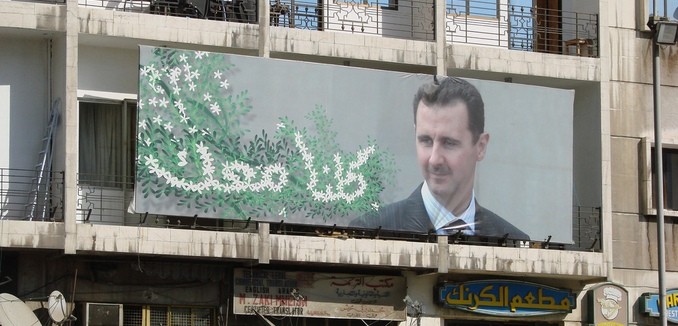A growing number of commentators in the Arab world and the West believe that there are increasing signs of the collapse of the regime of Syrian President Bashar al-Assad, in light of key military losses in Hama and the province of Idlib, where Jisr al-Shughur, the last town in that area under its control, recently fell (Arabic link) to rebels.
The latest achievements of the rebels, especially by the al-Qaeda affiliated al-Nusra Front, come as part of what they call (Arabic link) “Operation Syria Liberation Storm.” The rebels also scored a significant victory in battles near the city of Qardaha, a key Alawite city in the Latakia province, the home base of Assad. Analysts say the losses by Assad’s forces represent a strategic change in the Middle East, because the rebel victories mean Latakia province is now exposed militarily. Commentators told Al-Arab (Arabic link) that Latakia Governorate will likely be the next major target in the opposition campaign to topple Syria’s dictator.
Jisr al-Shughur is of high strategic importance (Arabic link) due to its location between Latakia and the city of Aleppo. It is also close to the Turkish border, from which equipment and fighters are being transferred to the rebels.
The new campaign in northern Syria is intended to create a new balance on the ground that will weaken the Syrian regime and force it to sit down at the negotiating table. Some commentators say that the strategic goal of this campaign is the destruction of the Iranian “bridge” that links Baghdad to Beirut through Syria.
Robert Ford, the former American ambassador to Syria, wrote in an analysis for the Middle East Institute that despite Assad’s continued assistance from Iran and Russia, the latest developments in Syria point to the beginning of the end of his regime. Ford pointed to internal divisions within the inner circle of the regime, and mentions reports of the deaths (or disappearances) of former senior security personnel such as Rostam Ghazaleh, Rafiq Shehadeh, and Hafiz Makhluf, Assad’s cousin. All of them have disappeared in the past six months. Ford observed that no such dissension at the top of the regime was apparent during the first three and a half years of the rebellion.
The Syrian regime has indicated a growing desire (Arabic link) to attend negotiations hosted by Russia, unlike its refusal to do so in Geneva last year. The step down from his previously defiant position shows Assad is not as strong as he once was.
[Photo: Michael Goodine / Flickr ]




